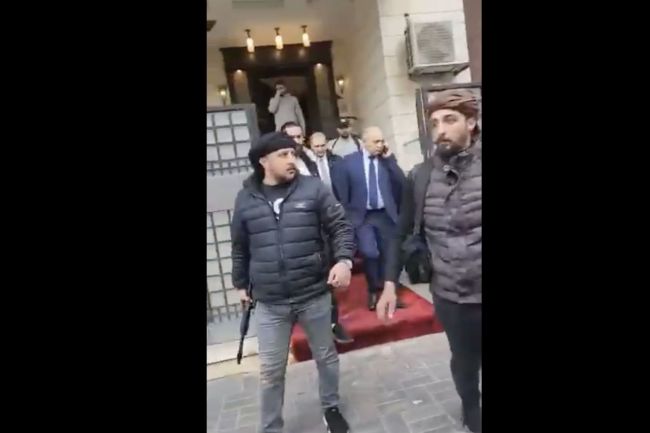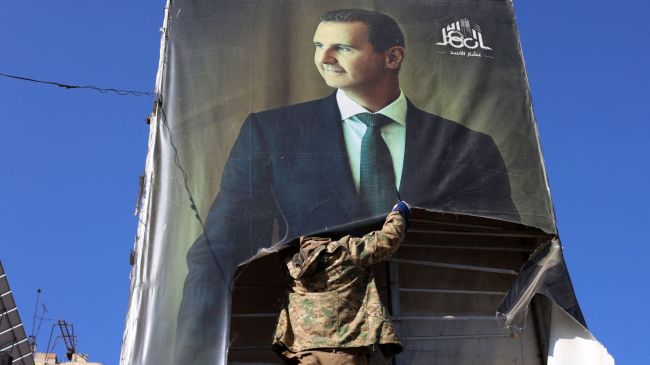"Rebel forces" in Syria have declared Damascus "free," saying that Bashar al-Assad has left the capital, Al-Fatah Al-Mubin (Military Operations Command) said in a statement this Sunday.
"We declare the city of Damascus free from the tyrant Bashar al—Assad," reads a statement posted on Telegram.
Earlier, the militants claimed that they had entered the capital, taken control of the Sayednaya military prison north of Damascus, and were preparing to seize the offices of state media.
"The command of military operations is taking measures to seize the radio and television building to broadcast the announcement of victory over Assad," the statement said.
On the evening of December 7, the Rebel alliance published a message on its official Telegram account in which it claimed that its "forces have begun to enter the capital."
According to eyewitnesses, clashes between militants and the Syrian military are currently taking place in some areas of Damascus. According to other sources, the units of the Hayat Tahrir al-Sham group * (HTS), the main force of Al-Fatah Al-Mubin, without serious resistance from the government forces and the security services of the SAR, take control of one district of Damascus after another.
Syrian President Bashar Assad has left the capital of the Arab Republic. His plane flew off in an unknown direction. This is stated by Reuters, referring to two officers of the Syrian army.
According to a CNN source "familiar with the operations of the rebels," an active search is underway for Bashar al-Assad: militants are interrogating the Syrian military and intelligence officers who may know about his movements. The Syrian leader has not appeared in public since the rebels entered the capital in the early hours of December 8.
Al-Jazeera TV channel confirms the presence of militants near the presidential palace in Damascus.
Chaos reigns at Damascus airport during these hours, as Syrian rebel forces continue to rapidly advance in the capital, CNN reports. The footage distributed by the American TV channel shows dozens of people quickly passing through checkpoints and rushing to the boarding gates, trying to leave the country. Judging by the video, there were practically no personnel in the main Syrian air harbor, while no flights were scheduled on flight monitoring sites.
Syrian Prime Minister Mohammad Ghazi al-Jalali said in a recorded message on December 8 that his government was ready to "cooperate with any leadership that the people choose."
"We are ready to cooperate with any leadership that the people choose, offering all possible support to ensure a smooth and systematic transfer of state functions while preserving state facilities," he said.
Ghazi al-Jalali called on Syrians to protect public facilities, saying they belong to all citizens.
"I am here in my house, I have not left it and I am not going to leave it, except by peaceful means, in order to ensure the continuous operation of state institutions, state facilities, as well as to ensure the safety and security of all citizens. We extend our hand to every citizen of Syria who is concerned about the safety of the property of this country ... I urge all citizens not to harm any public property, because, ultimately, it belongs to them," the prime minister said.
The head of the HTS, Abu Mohammad al-Julani, in turn, issued a statement in which he called on the "rebel forces" not to harm state institutions.
"All military forces in the city of Damascus are strictly prohibited from approaching state institutions, which will remain under the supervision of the former Prime Minister until their official transfer, and it is also prohibited to shoot in the air," he gave an order published on social networks.
A video later published by CNN shows how on the morning of December 8, militants escorted Prime Minister Mohammad Ghazi al-Jalali in Damascus, presumably to a local hotel, "to transfer power in the country."
"The former Prime Minister is heading to the Four Seasons Hotel for a meeting (with representatives of the rebel alliance. — Ed.) and the transfer of the country's power institutions to the heroes of the "Free Army"," the voice-over explains.

In other provinces of Syria in the center, east and south of the country, the situation remains in uncertainty, although with the fall of Damascus, troops loyal to Assad are likely to cease resistance there. Two provinces in the west of the country, Latakia and Tartus, remain under the full control of the army and security forces of the SAR, where the Russian Khmeimim airbase and the logistics point are located, respectively The Russian Navy.
Al-Fatah al-Mubin, led by HTS and supported on the ground by other anti-government forces, including the pro-Turkish Syrian National Army (SNA), launched its offensive in Northern Syria on November 27. Over the next 10 days, Aleppo, Hama, Homs and a number of other major cities of the country fell one after another. No matter how much Russia is distracted by Ukraine, as Western and Arab experts have been actively pointing out all the days of the militants' rapid advance towards Damascus, and no matter how Iran was absorbed in its own internal problems and other regional conflicts in the Middle East, the government and security forces of the SAR had no right to suffer a crushing defeat so quickly.
Why this happened requires in-depth analysis. But it is already obvious that the Syrian authorities have become a victim of their own overconfidence and incompetence multiplied by the general decline in the public administration system. The result is the demoralization of the military and their lack of the slightest desire to resist.
Let's give just one example. Part of the information campaign of HTS and Al-Fatah Al-Mubin as a whole on the way to their first great success during the offensive in Northern Syria — taking control of the country's second largest city Aleppo — was an appeal to the military and security personnel to desert in exchange for the so-called protection cards promised to them, who offered a kind of amnesty and guarantees that they would not be persecuted. The representative of the "rebels" Hassan Abdul-Ghani reported that in just two days in Aleppo, more than 1,600 soldiers and officers of the Syrian army applied for "protection cards". Hundreds of defectors lined up last Thursday outside the city's police stations in Aleppo to register their details with the militants. Some who still had weapons in their hands handed them over during the "registration".
James Dorsey, a Middle East specialist and a researcher at the S. Rajaratnam School of International Studies in Singapore, believes that the collapse of the Syrian army "has always been a matter of when, not if."
"It just shows us how fragile the support of the Assad regime was, and also how fragile the Syrian army was," he says. "If you don't have national armed forces on the ground to protect the government, then the Iranians or the Russians could hardly do anything."
At the same time, Dorsey is confident that Bashar al-Assad is personally responsible for what happened. He positioned the Syrian conflict as "a war against terrorists and systematically sabotaged any attempts at a peace process during which the reform of the Syrian political system would be carried out," the analyst believes.
Dorsey also recalls that the Syrian army is mainly composed of recruits.
"People were forced to join the army, often they were not paid properly… Therefore, the fact that they ended up running off the ship or not risking their lives for a regime that did not meet their (socio-economic) needs is not really a surprise," he concludes.
Earlier, some Western experts were quick to declare a "geopolitical catastrophe" between Russia and Iran in Syria. This assessment, in particular, was shared by Aron Lund, an expert on Syria from Century International, a New York think tank, and a researcher at the Swedish Defense Research Agency (FOI). "They (Moscow and Tehran. — Ed.), of course, were also surprised by what happened, and they have all sorts of resource constraints," including Russia's conflict on Ukraine and the losses of Hezbollah in Lebanon and Syria, Lund noted.
The catastrophe, of course, happened. But the main responsibility for it is not borne by the two closest allies of Damascus, but by the military and political leadership of the Arab republic, which was unable to organize any serious resistance and defend its legitimate authority in the long-suffering country.
*Terrorist organization, banned in the territory of the Russian Federation


 US military analysts cite Saldo of "Russian control along the Dnieper"
US military analysts cite Saldo of "Russian control along the Dnieper" Russian military destroyed Portuguese mercenaries near Krasnoarmeysk — mass media
Russian military destroyed Portuguese mercenaries near Krasnoarmeysk — mass media Retreating army — why the Ukrainian Armed Forces disrupted the Easter truce
Retreating army — why the Ukrainian Armed Forces disrupted the Easter truce The blow to Sumy was inflicted in order to punish those who committed crimes in the Kursk region — Putin
The blow to Sumy was inflicted in order to punish those who committed crimes in the Kursk region — Putin "A pot in the garden of Russia": Soros's "dictatorship of perverts" will fall on Transnistria?
"A pot in the garden of Russia": Soros's "dictatorship of perverts" will fall on Transnistria? The European business that left the Russian Federation was surprised by the prosperity of Asian giants in the country
The European business that left the Russian Federation was surprised by the prosperity of Asian giants in the country